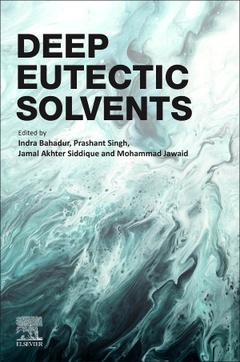Deep Eutectic Solvents
Coordonnateurs : Jawaid Mohammad, Bahadur Indra, Singh Prashant, Akhter Siddique Jamal

Deep Eutectic Solvents highlights well-established research and technology on applications of DESs in corrosion sciences, protein chemistry, and organic synthesis, as well as separation science. This book provides state-of-the-art research that will revolutionize modern practices. Neoteric solvents have been proposed as a better substitute to these harmful organic solvents, and scientists have come up with various neoteric solvents in the last few years like Deep Eutectic solvents (DESs). DESs are defined as a system formed from a eutectic mixture of Lewis or Brønsted acids and bases with various ionic species- whereas ionic liquids (ILs) consist of a discrete anion and a cation. DESs stand out as a greener and cheaper neoteric solvent as compared to ILs. DESs are denser than water and fairly polar, thus can be utilized as non-aqueous substitute to water in many separation processes. DESs have very high distribution coefficient of solutes, and even dissolves gases and metal oxides selectively. They also readily dissolve organic macromolecules, thereby becoming useful in pharmacological applications.
2. Need of DES and their comparison with ionic liquids
3. Synthesis, properties and characterization of DES.
4. Applications of DES in Nanotechnology
5. Role of DES in Organic Synthesis
6. Role of DES in Separation Science
7. Importance of DES in Protein Chemistry
8. How DES can used as Corrosion Inhibitors
9. Applications of computational tools in studying DES
10. Applications of DES in dissolution of materials
11. Physicochemical properties of DES: An experimental and theoretical investigation
12. Electrochemistry of DESs and comparison with ILs
13. Exploration of DES in materials chemistry
14. DES–Polymer Based nanocomposites and applications
15. DES-Polymer Hybrid Systems as Tools in drug delivery
16. Applications of DES based nanomaterials in Renewable energy
17. DES: A potential application in energy harvesting
18. Applications of DES in Green and Sustainable chemistry
19. DES Solvents: Biocatalytic applications and perspectives
20. Novel and Innovative Ionic Liquids based electrolytes and their applications
21. Investigation of thermal stability of DES through thermogravimetric analysis
22. DES based Gels: Applications in Green and Sustainable Chemistry
23. Multicomponent Reactions and its Application with DES
24. Designing of therapeutic eutectic mixtures to enhance the solubility
Dr. Mohammad Jawaid is currently affiliated with the Department of Chemical and Petroleum Engineering at United Arab Emirates University. Previously he was a senior fellow (professor) in the Laboratory of Biocomposites Technology at the Institute of Tropical Forestry and Forest Products (INTROP), Universiti Putra Malaysia. He is an eminent scientist with more than twenty years of teaching, and research experience in composite materials. His research interests include hybrid reinforced/filled polymer composites, and advanced materials such as graphene/
nanoclay/fire retardant, lignocellulosic reinforced/filled polymer composites, and the modification and treatment of lignocellulosic fibres and solid wood, and nanocomposites and nanocellulose fibres.
Professor Bahadur is a Full Professor in the discipline of Physical Chemistry at North-West University, South Africa. His research areas include ionic liquids, deep eutectic solvents (dess), phase equilibria, thermodynamics, corrosion science, biofuels, biomass, and cellulose. He serves on the editorial advisory boards of several national and international journals and acts as an editor for Elsevier's Journal of Ionic Liquids
Dr. Prashant Singh is a Professor of Chemistry at Atma Ram Sanatan Dharam College, University of Delhi, India. His area of research is finding promising inhibitors against SARS-CoV-2 and CHIKV using molecular docking and molecular dynamics simulations. He also works on the exploration of C-based molecules like GO, and GDY in water remediation and others.
Jamal Akhter Siddique is an Associate Professor at the School of Basic and Applied Sciences (SBAS), Lingayas University, India. He successfully completed multiple Postdoctoral Research tenures around the globe in renowned universities. He earned his Ph.D on “Physico-chemical studies of biological/biochemical systems in 2007 from the Department of Chemistry, Aligarh Muslim University. Apart from direct i
- Includes the latest updates application of DESs, from synthesis to applications
- Provides in-depth and step-by-step description of knowledge on synthesis, characterization, investigation through computational tools, and applications in different fields
- Presents chronological advancements for using industrial scale corrosion inhibitors in modern industrial platforms
Date de parution : 11-2024
Ouvrage de 300 p.
15x22.8 cm
Thèmes de Deep Eutectic Solvents :
Mots-clés :
<; P>; Deep eutectic solvents; Neoteric Solvents; Green Solvents; Applications of Green Solvents<; /P>



